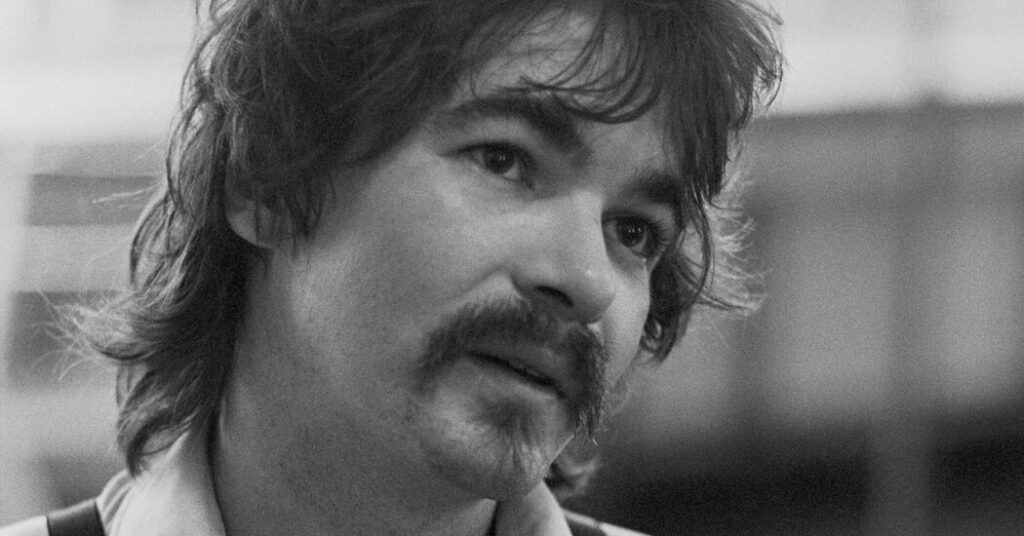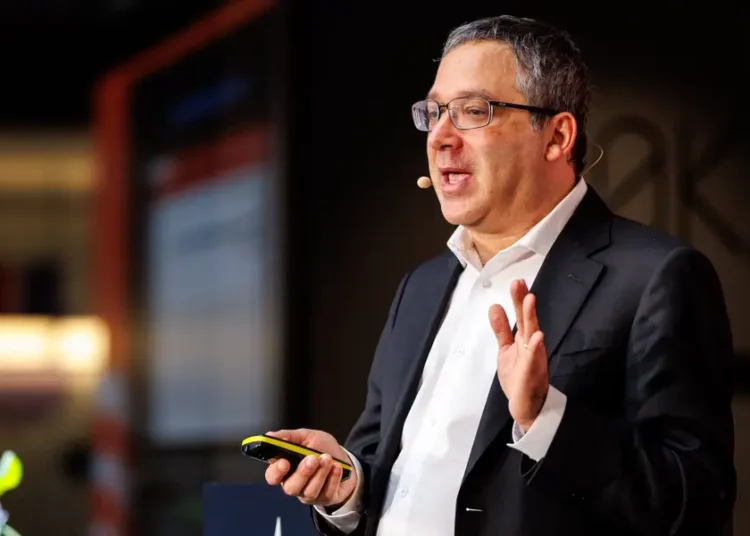For someone so close to his family, friends and community, John Prine’s funeral was an uncharacteristically distant affair. The memorial service for the singer-songwriter, who died from complications of Covid-19 in April 2020 at 73, had been made strange by the pandemic.
“We had to beg for the opportunity for the immediate family to even gather at the funeral home here in Nashville,” recalled his wife, Fiona Whelan Prine. “We were literally sitting eight feet apart. There was no hugging. There was no commiserating.”
Prine received a more fitting send-off in October 2022, as his loved ones, fellow musicians and fans were finally able to safely congregate for a pair of star-studded tribute concerts at the Ryman Auditorium, part of a weeklong commemoration of his life and music. “That was so beautiful,” Fiona recalled in a recent video interview. “It was something we all needed so badly.”
Those shows form the basis of a new documentary, “You Got Gold: A Celebration of John Prine,” which debuts at New York City’s Quad Cinema this week, with a streaming release planned for 2026. The film, directed by Michael John Warren, mixes the Ryman performances and backstage scenes with archival footage of the charismatic twinkly eyed Prine.
Nearly all the performers from multiple generations — including Tyler Childers (31) and Ramblin Jack Elliot (91) — maintained a strong personal connection to Prine,; some were mentored by him, and others toured with him or recorded with him. As the musician Alejandro Escovedo notes in the film, Prine was “more than just a songwriter, he became a friend.”
That profound sense of intimacy was the hallmark of Prine’s work. He was born and raised in Maywood, Ill., and the family’s tiny cottage was a hothouse of folk and country music from their native Kentucky. He served as an Army mechanic in Germany, and returned to his job with the U.S. Postal Service after his discharge, dreaming up songs on his mail route by day and performing them in Chicago folk clubs at night. Championed by the newspaper columnist Roger Ebert and the musician Kris Kristofferson, who helped him get signed to Atlantic Records, Prine kicked off his recording career in 1971 with a self-titled collection of humanistic story songs that was an auspicious start to a five-decade career.
In “You Got Gold” an array of performers put their interpretive spin on Prine’s imagistic catalog: the War and Treaty’s gospel-tinged glide through “Knockin’ on Your Screen Door”; Jason Isbell’s mournful reading of “Souvenirs”; Gillian Welch and David Rawlings’s dreamy take on “Hello in There.” The film’s emotional centerpiece comes with an appearance by Bonnie Raitt, performing her Prine-written signature, “Angel From Montgomery,” as a devastating duet with Brandi Carlile.
In an interview, Raitt marveled that Prine wrote “Angel” — the story of a middle-aged woman stuck in a sad domestic purgatory — when he was in his early 20s. “The empathy in John, in his songs, was so immediately apparent,” she said. “That’s one of the things that endeared him to me, and I think, to everyone else.”
The R&B singer Jerry Williams Jr., known as Swamp Dogg, first heard Prine’s music when he was working as a producer for Atlantic in the early 1970s. His achingly soulful 1972 rendition of Prine’s tale of a Vietnam vet and addict, “Sam Stone,” would become arguably the definitive version.
“See, John wrote from a place that most people can’t get to,” Williams said in an interview. “He’d write things that you’d never even think of writing about.” Williams noted that he recently cut a version of Prine’s “Please Don’t Bury Me,” a wry metaphysical death narrative. “His songs could be sad, man,” Williams added, “but they’re still funny, and they’re always on time. His thing was timeless.”
After the first “You Got Gold” concerts in 2022, the shows became an annual event each fall around Prine’s birthday. In October, after another round of concerts, Fiona Prine announced the series was ending. “It felt like good time to bring it a close with the film as a bookend,” she said, and noted that the profits from “You Got Gold” helped establish the family’s Hello in There Foundation, which has given nearly $1.5 million to marginalized individuals and communities.
Five years on from Prine’s death, there’s the inevitable sense that life has moved on. Fiona sold the grand South Nashville house that was supposed to be the couple’s forever home, and resettled in a smaller place near their children, Jack and Tommy, and her son, Jody Whelan, whom Prine had adopted. “Our family’s grown so much since John’s passed — we’ve got four grandchildren and a fifth on the way,” Fiona said, with a sigh. “He would have loved that.”
The family business, Prine’s longtime independent record company Oh Boy, continues to thrive, with Whelen and Jack Prine handling day-to-day operations. Tommy Prine is prepping a second solo album for the label, whose roster includes the emerging Americana artists Palmyra, Kelsey Waldon and Emily Scott Robinson.
When he died, Prine was in the midst of remarkable if unexpected late-career renaissance. His 2018 comeback album, “The Tree of Forgiveness,” was released to raves. He collected a Grammy lifetime achievement award, entered the Songwriters Hall of Fame, was named honorary Poet Laureate of Illinois and saw his work venerated by a new generation of musicians including the indie rocker Kurt Vile and the country star Kacey Musgraves.
“I think John was somewhat bemused by all of the accolades that were coming his way,” Fiona said. “He was bemused but also thrilled. To get that kind of recognition after being in the business for 45 years, it was gratifying for him. But there was more that he wanted to do.”
One such project was a memoir Prine planned to write with Tom Piazza, the New Orleans-based journalist and novelist. Piazza profiled Prine in 2018 for the Oxford American magazine, spurring a fast friendship and a literary collaboration they began just as the pandemic hit.
Piazza eventually decided to turn his experiences with the musician into a more personal recollection, “Living in the Present With John Prine.” The book — part buddy comedy, part road story, part meditation on mortality — was published in September and argues for Prine’s transcendence as a writer. Piazza noted in an interview that his work was “something beyond just song.”
Fiona Prine’s next mission is offering a better understanding of the man behind the music. She has begun developing another film, a narrative documentary on Prine’s life, and is organizing his voluminous personal archive as part that effort. “I’ve been opening boxes from 20, 30 years ago,” she said, “and discovering all these little corners of John’s life that I hadn’t seen before.”
Despite Prine’s genial persona — that of a beatific cherub-cheeked sage of sorts — he was, she said, a more complicated character than the public perceived. Prine had been married and divorced twice — to his high school sweetheart Ann Carole Menaloscino and later to the musician Rachel Peer — and survived life-threatening bouts with cancer in 1997 and 2013.
“John was as complex a human being as any of us,” Fiona said. “At one point, he admitted that he could be found in all of his lyrics. As much as he wrote from his imagination, or his observations of others, there’s so much of John in his songs.”
Collectively, Prine’s work also serves as unique chronicle of the American experience from the postwar era through the internet age. He was, in his way, the Frank Capra of folk, a writer whose songs Bob Dylan famously hailed as “Midwestern mind trips to the nth degree.”
For Fiona, a native of Ireland who came to the United States after falling in love with Prine in the early ’90s, “he represented all that was good and possible about America,” she said. “Yet I saw him become pretty despondent towards the end of his life when he started to see where things were going in this country.”
What Prine might have thought or written about America at the bitter end of 2025 will never be known. But for those seeking answers, or perhaps just some comfort, there are still the more than 200 songs he turned out during his life.
“His messages and his stories are the legacy that will keep going,” Raitt said. “When I’m feeling really down, there’s certain songs of his that I’ll put on and listen to. Even if it makes me cry because I miss him, I’m just so happy to hear them. I think that’s how a lot of people feel about John Prine.”
The post 5 Years After His Death, John Prine Gets a Cinematic Send-Off appeared first on New York Times.




